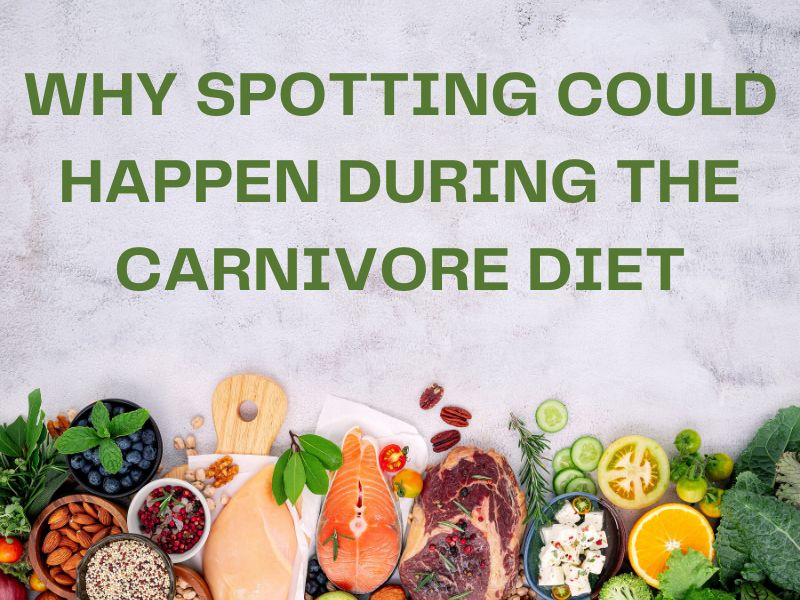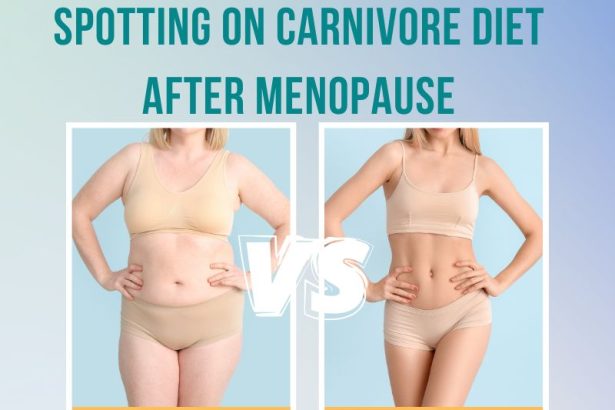The carnivore diet, which mainly focuses on the intake of animal products, is increasingly gaining popularity, especially because it is uncomplicated, and a number of its practitioners report significant health improvements such as weight loss, reduced inflammation, and better focus. On the other hand, ladies who are going through menopause and would like to embrace the carnivore diet may have particular problems that they have to deal with. Spotting is one of the issues which are more of a concern for the postmenopausal woman who is not supposed to bleed any more.
This article is aimed at answering some common questions including the causes of spotting when one is on carnivore diet after menopause, its effects on hormonal balance as well as the interventions that can be taken. It will also be aimed at providing advice on how to adjust this diet to help minimize the spotting, while still retaining the possible health benefits that come with a carnivore diet, especially for ladies who are going through menopause.
Understanding the Carnivore Diet
All plant foods are eliminated in the carnivore diet as the focus is only meat, fish, eggs and animal products. Supporters of this diet state that it helps reduce the inflammatory response, improves metabolic activity and, most importantly, provides a variety of highly useful elements that ensure the body works properly. Nevertheless, studies are being undertaken to unearth the restrictions of the carnivore diet, particularly its consequences for older women who have reached the age of menopause.
Women with a history of menopause and those with changing periods of dietary habits following a carnivore diet may be impacted by sights in their postpartum recovery stage. While some women may report higher profitability satisfaction, some may get spotting which is a form of a period which could be attached to diet patterns.
Menopause and its Related Hormonal Changes
The term menopause refers to the period when a woman’s reproductive age ends which is usually marked with at least 12 months without menstruation. It happens with hormonal variations of estrogen and progesterone which are the two most important hormones in controlling the menstrual cycle. With low levels of estrogen and progesterone during menopause, most women suffer from symptoms such as hot flashes, night sweats, and even dryness of the vagina.
After this stage of life spotting should not be expected, and therefore is said to be abnormal. It may be the reason for some such as an endometrial polyp, hormonal imbalance or, worst endometrial cancer among others. Thus, all cases of spotting cases should be reported to the healthcare provider. However, with spotting some cases of endometrial cancer have been associated with diet and lifestyle, the carnivore diet may be a factor in some of these women’s cases.
Why Spotting Could Happen During the Carnivore Diet

The carnivore diet is a saturation type of diet, and many women use it in the postmenopausal stage with no menstruation. The diet alone does not create such conditions, but it does lead to some spotting that one has to be familiar with. The following makes spotting a possibility considering the various reasons why a postmenopausal woman might have spotting on a carnivore diet:
Dietary And Hormonal Changes
The dietary approach of cystic fibrous growth can be considered very effective as there are no phytoestrogens to introduce in the body. Phytoestrogens, which modulate estrogen hormones, are mostly present in soy foods, flaxseeds, and legumes. Thus, there is always the risk of decreased hormone production and this in the long run may lead to postmenopausal ovulation spotting.
The diet was found to restrict insulin intake too, and insulin has a direct correlation with testosterone hormone. Any issue related to insulin would mean the inability to have proper sex hormone binding globulin levels which would lead to increased precipitation of estrogen relating to more spotting.
Lack of Nutritional Balance
It is common for women who are on the carnivore diet to experience nutritional imbalances which relate to minimal amounts of calcium, Vitamin E, magnesium, and fiber which are all linked to the ability of the female body to produce hormones. Magnesium is also very important in hormone production and loss of it may trigger some negative menstrual-like disorders which relate to spotting.
Increased Protein and Fat Intake
A diet rich in protein and fat as said in a carny diet can interfere with the liver functioning in metabolizing hormones. The liver is the only organ that can help with the breakdown of excess estrogen. If this organ is affected due to nutritional causes, the level of estrogen will rise and cause spotting.
Gut Health and Inflammation.
The carnivore diet can have beneficial or adverse effects on gut health. On the positive side, an elimination or reduction of the plant-based foods lowers the incidence of other digestion related conditions such as bloating or irritable bowel syndrome (IBS). On the contrary, lack of fiber may stress the gut microbiome composition which in turn is associated with low-grade inflammation. This inflammation may however affect the hormonal axis causing spotting.
Guidelines On How To Control Spotting While On A Carnivore Diet
With the increase of interest in the carnivore diet, we are starting to see more women experience spotting after menopause while following the diet. Before drawing any conclusions and blaming it on the diet, it’s best to first consult a doctor to rule out any medical issues that might be the reason for the spotting. Once medical causes have been excluded, there are various steps you can take to address diet-induced spotting:
Attempt to reintroduce phytoestrogens in small amounts gradually.
The carnivore diet calls for the removal of all plant-based dietary materials; however, under such a diet, it would be sensible to begin naming food products that possess phytoestrogens such as flaxseeds or soy in small quantities to see if that compensates for the drop in estrogen levels. Even a modest inclusion of these food items may alleviate spotting without derailing the overall objective of the carnivore diet.
Change the balance of your macronutrient emissions as well.
Your macronutrient ratios can also be adjusted; how much of each of those ratios you combine up to a maximal ratio on those macros points makes them hormonal medications. You may be consuming too much protein and not enough fat; therefore, too much appears to make some women hormonal disruptions. A goal should include a healthy ratio that’s appropriate for your metabolism levels and health in general. Sometimes increasing the amount of fat intake such as cuts of meat, organ meats, and other animal determinants like tallow, would be appropriate.
Key Nutrient Supplementation
If nutrient-deficiencies are suspected, it’s ideal to supplement with vitamins and minerals which assist cross-talk among hormones. Magnesium, vitamin D, and vitamin E are key nutrients that play a role in hormonal balance and can be gotten from supplements or from eating offal as they are super nutrients.
Water and Electrolytes
Another cause of spotting can be dehydration or an imbalance of electrolytes. A common problem noted with the carnivore diet which is relatively low in carbs is a quick depletion of water weight that can cause dehydration and electrolyte unbalance. Make sure you take plenty of water, and enough salt, potassium and magnesium to prevent dehydration and maintain proper cell functioning.
Take A Break From The Carnivore Diet
In other instances, allowing a short intermission limiting the carnivorous dietary approach assisting self recalibration may be beneficial. This doesn’t suggest the diet be completely abandoned but instead for a limited period reintegrating nutrient dense plants to ascertain whether symptoms resolve or not. This introduces the option of switching back on the carnivore diet or adopting a modified version that prefers how the body responds to the diet after menopause.
Long-Term Health on the Carnivore Diet After Menopause
Women after menopause want to go through transitions as smoothly as possible but they notice issues with hormone levels and there is even some spotting that takes quite a long time to go away. Being completely otherwise healthy should also include some long-term health considerations:
Bone Health
The post-menopausal women experience a drastic fall in estrogen levels and thus become more vulnerable to osteoporosis. Although protein and fats are sufficient on a carnivore diet, calcium, vitamin D and other nutrients which help bone development should also reside in the diet. Weight-bearing activities and exercises depending on their intensity, when done in addition to sufficient nutrient intake ensure optimum bone density is achieved.
Heart Health
Women have had concerns over heart health due to the increased consumption of animal fats while on the carnivore diet. Recent studies have shown that fat is not as dangerous as practiced before, however lipid profile evaluation and the general cardiac health is still necessary, primarily after menopause when cardiovascular disease becomes more common.
Mental and Emotional Well-being
Menopause can be difficult, especially in a mood where anxiety, depression and mood swings are common. The carnivore diet has been reported to assist one to have 76% less polarized moods which can be a great help but once again, emotional health must be preserved.
Conclusion
It is normal for women to be anxious when they experience spotting after menopause, however, the cause should be looked into in detail. According to women who follow a carnivore diet hormonal changes, deficiency of certain elements and a change in metabolism may be the reasons for the occurrence of spotting. By resolving the issue of nutrition, gradually replenishing those nutrients, as well as individual treatment of the doctors, this problem can be resolved while enjoying the carnivore diet as well.
Adopting a proactive approach toward your health in the postmenopausal phase including dietary modification as applicable and regular monitoring will enable you to continue your carnivore diet. It must be emphasized that a woman’s body is exceptional, and how her body responds to various therapies will largely determine her comfort and achievement.


